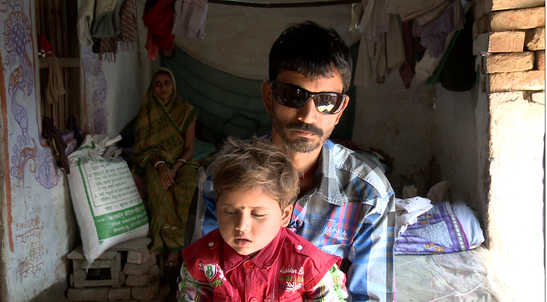Saibal Chatterjee
The part of India that New Delhi-based journalist-filmmaker Amitabh Parashar belongs to hit the global headlines in the early 1980s for what is known as the Bhagalpur blindings. All these years later, the gruesome incident in which policemen poured acid into the eyes of 33 undertrials still affects the Bihar district in shockingly brutal ways.
Parashar captures the disturbing phenomenon of instant mob justice in a powerful new documentary, The Eyes of Darkness, which homes in on a blinded ex-criminal’s struggle for justice in the face of government and media apathy.
Munna Thakur, in his mid-thirties, was assaulted in the late 2012 because his wife dared to contest an election for the post of village sarpanch against a higher caste candidate. Pushed into the abyss of darkness, Munna and his family have lived in fear ever since.
Via Munna’s story, Parashar’s eye-opening film reveals that the barbaric use of blinding as a tool to punish adversaries and perceived wrongdoers has continued unabated in Bhagalpur and neighbouring areas.
“Blind justice is still commonly dispensed with in Bihar,” he says. “The targets are petty criminals; sometimes even teenage girls and boys are blinded… The consequences are obviously tragic for the victims.”
In The Eyes of Darkness, we see Munna and legal rights activist Ram Kumar Mishra fight in vain to put his cruelly disrupted life back on track. The film turns the spotlight on other blinding victims as well — one of them, Bhola Chaudhury, from the group of suspected criminals blinded in the Bhagalpur police custody in 1980.
“Caste and political rivalry, personal enmity and misguided vigilantism lie at the root of the continuing horror,” says Parashar, who was a schoolboy in Bhagalpur when forced blinding was first introduced into the police lexicon.
Citizens quickly began resorting to blinding in cases of the pettiest crimes and acts of intransigence. In a recent incident, a 10-year-old girl from Lakhisarai had one of her eyes gouged out because she stole green peas from a farm.
Says Parashar: “I was returning from school one day. I saw a man crying for help. He had holes in his eyes with blood oozing out of them. He was one of the 33 Bhagalpur blinding victims. That grisly sight has haunted me ever since.”
Over three and a half decades later, cases of blinding continue to be reported. “In January 2017 alone, at least three new incidents of forcible blinding in Bihar have come to light,” says Parashar, who researched for and filmed The Eyes of Darkness over a period of three years.
The film owes its genesis to a “personal trip” that Parashar made to Forbesganj in 2013. “I stayed in Aurahi Hingna, the village of litterateur Phanishwar Nath Renu,” he says. “I was there to meet the late writer’s family. I came to know of two villagers, who had lost their eyesight in a mob attack. The victims were Munna Thakur and his friend Kanhaiya Thakur.”
“As I delved deeper into Munna’s plight, I realised that he was by no means the only one to have fallen prey to an irate mob and lose his eyes, that there were numerous similar cases that had occurred over the years,” says Parashar. Not a month passes, he says, without a blinding taking place somewhere or other in Bihar.
Unlock Exclusive Insights with The Tribune Premium
Take your experience further with Premium access.
Thought-provoking Opinions, Expert Analysis, In-depth Insights and other Member Only Benefits
Already a Member? Sign In Now











